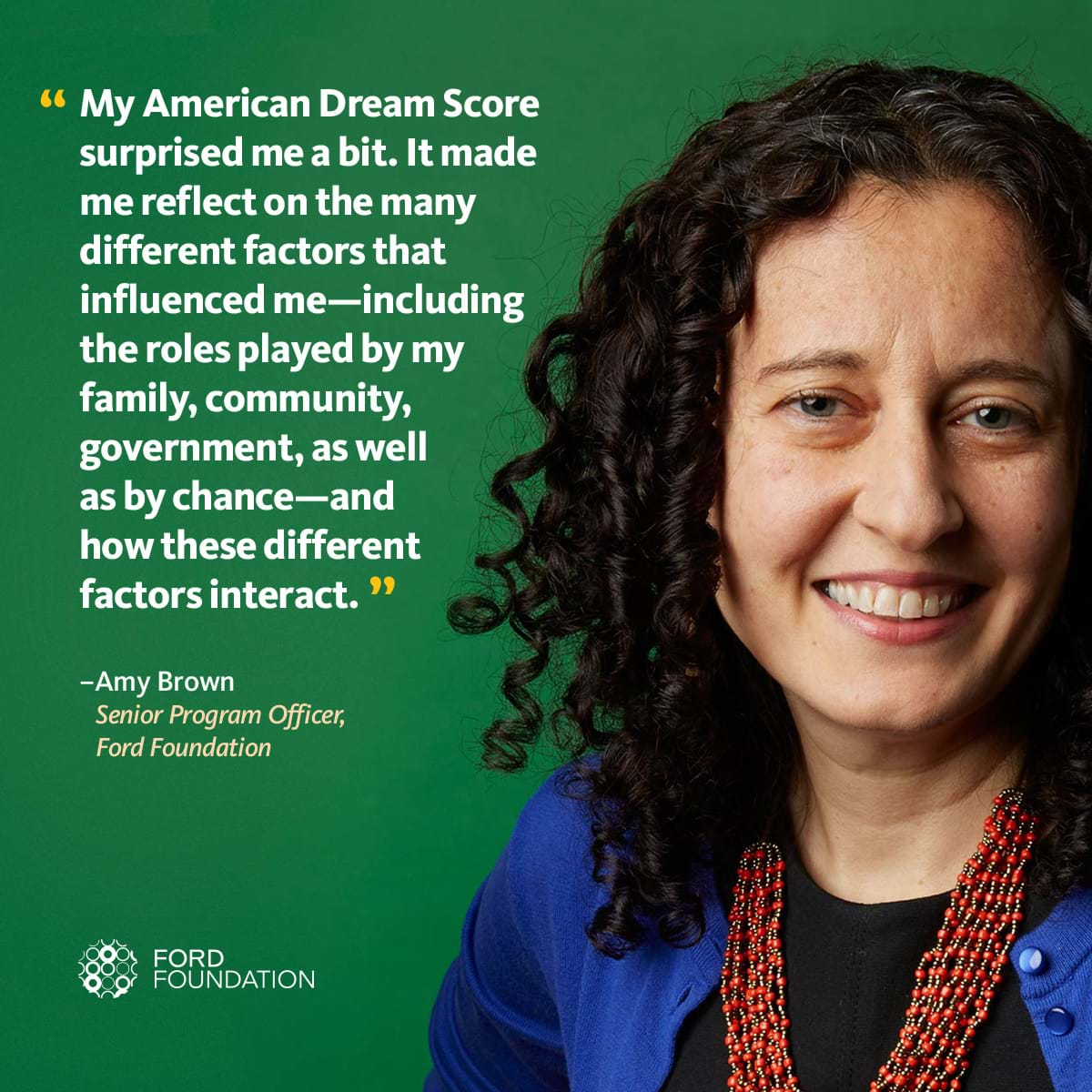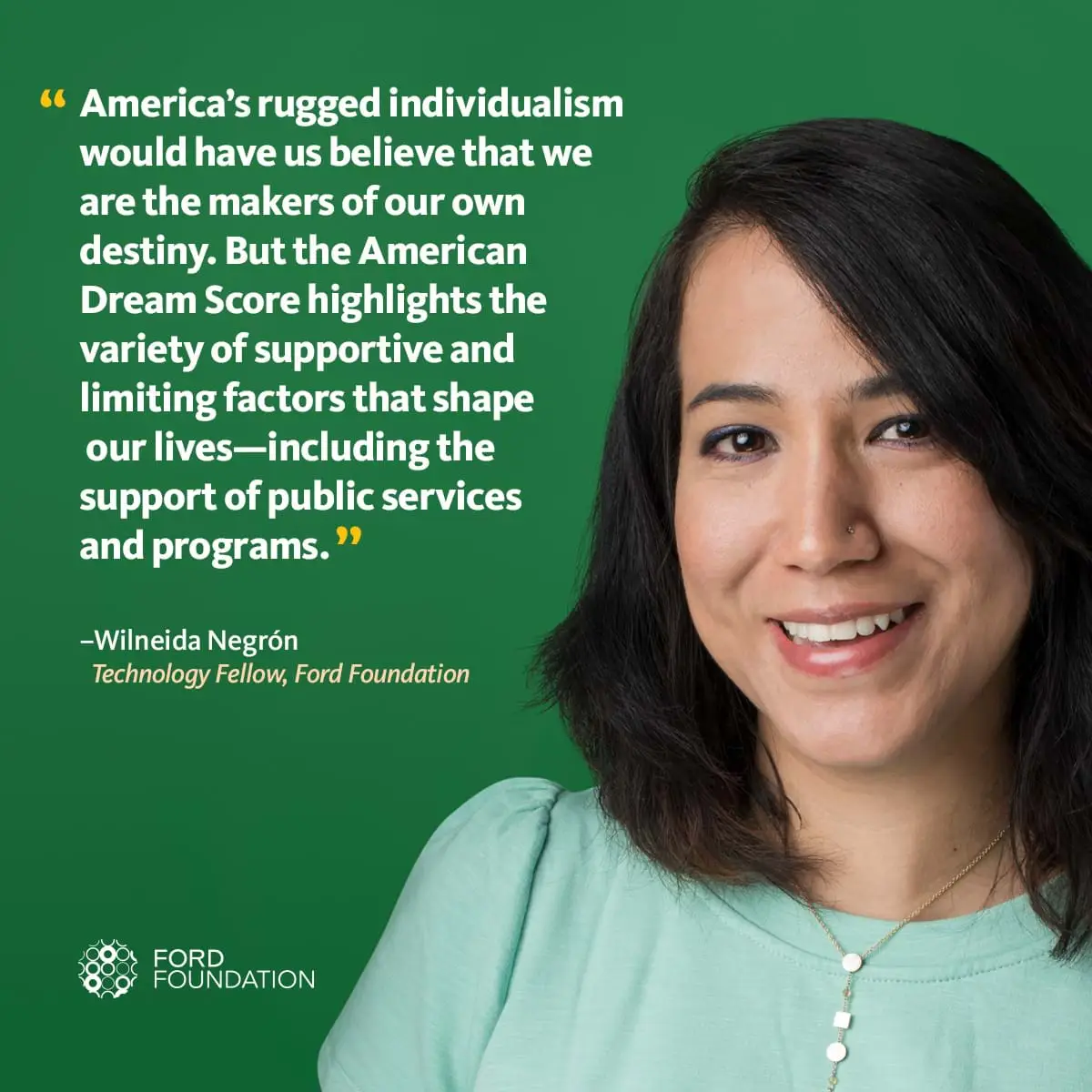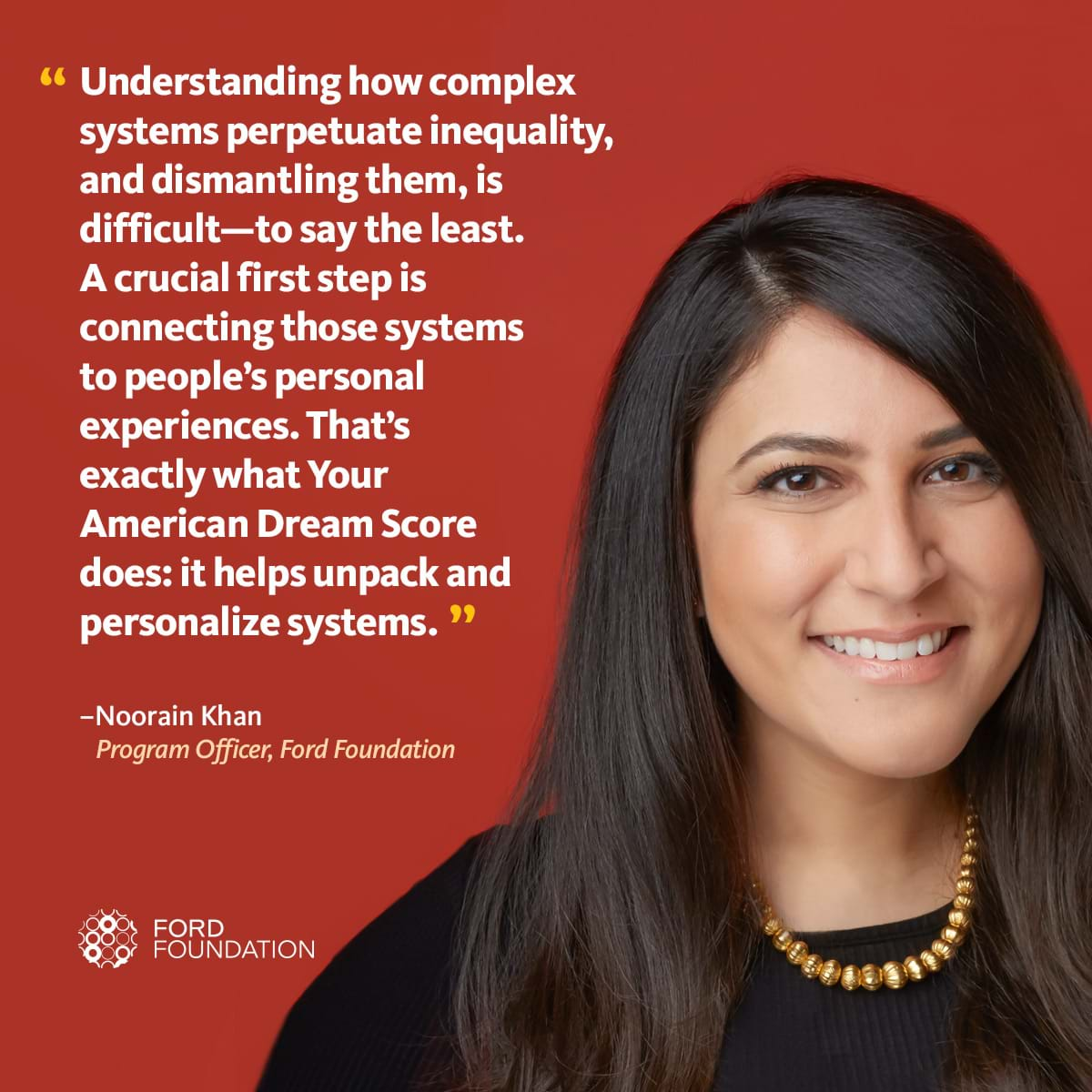
Around the Ford Foundation and around the world, we’ve all been talking and thinking a lot about how inequality affects our ability to achieve the fabled American Dream: the idea that if you work hard and play by the rules then you should be able to get ahead. Inspired by these conversations, we worked with our partners at Moving Up to develop a new tool we’re calling Your American Dream Score.
Your American Dream Score aims to help us examine the many experiences, systems, and institutions that have helped—or hindered—our path to where we are today, and to jump-start honest discussions about the role of inequality and opportunity in our lives. To mark its launch, we asked some of the foundation’s program staff to take the quiz and reflect on their own American Dream Scores. To find out yours, take the quiz here.

We can’t do it alone
Amy Brown, Senior Program Officer, Civic Engagement and Government
As Americans, we grow up with stories about bootstraps, merit, and willpower—and these stories prime us to overestimate our personal role in both success and failure. I’ve heard people who were born on third base claim they did it all themselves because they worked hard in school, without acknowledging that the opportunities they were born with set them up to go to the best schools. And I’ve heard low-income mothers criticize themselves for being poor budgeters, even though the best budgeter couldn’t make the math work on minimum wage earnings.
My American Dream Score surprised me a bit. It made me reflect on the many different factors that influenced my opportunities and success—including the roles played by my family, community, government, as well as by chance—and how these different factors interact. My story relied primarily on two of the factors, which were able to compensate for the others. I was fortunate in that way.
The truth is that government support is central to the success of even those from the most privileged backgrounds. We can’t do it all on our own, much as we might want to tell ourselves that we did. So I found it important that a person’s score considers both subsidized housing and the home mortgage tax deduction, both unemployment benefits and the availability of public transportation to get to work. I was reminded of research about how many families are able to use home equity subsidized by the mortgage tax deduction to finance college with less debt, setting their children off on an easier path.
Government also plays a critical role in leveling the playing field of opportunity that underlies the American Dream. Government has the ability to ensure that a person’s access to good schools, a safe neighborhood, and decent medical care is not dependent on his or her fortune or family. The more we invest in government as a platform that lifts us all, and use the levers of public policy to equalize opportunity, the less our individual stories or luck will determine (or undermine) our achievements. Ironically, only when we acknowledge that none of us can do it on our own will we be able to say we did it ourselves.

Early opportunities lead to later success
Sanjiv Rao, Senior Program Officer, Youth Opportunity and Learning
Like Amy, my American Dream Score caused me to pause and reflect on my own circumstances. Despite the polarized, unequal world we live in, the questions the quiz poses are pretty universal. It’s the responses that shed light on disparities and inequalities of opportunity and outcome, and how they play out in people’s lives.
I appreciated how the tool integrated questions related to privilege and barriers, and challenges the ways people typically understand those things. The tool is designed as both a window (to cultivate empathy) and a mirror (to spark reflection), both of which help us reflect on our personal situations in a broader context, and consider our roles as individuals and members of society. The tool’s mix of facts (“I graduated college”) and perceptions (“the odds have generally been in my favor”) illuminates the combination of factors that inform how people make sense of their reality.
From my perspective as a former public school teacher whose life’s work has kept me in the field of education, the number of factors in Your American Dream Score that relate to youth opportunity, education, learning, and healthy development reinforce the importance of those issues. To disrupt inequality on a broad scale, it is essential that we keep public promises and ensure strong safety nets for young people.

Challenging the myth of rugged individualism
Wilneida Negrón, Technology Fellow
America’s rugged individualism would have us believe that we are the makers of our own destiny. But is this really the case? Everyone’s American Dream Score highlights the variety of supportive and limiting factors that shape our lives—including the support of public services and programs.
The dominant narrative about government services tends to be that they are wasteful. At the same time, public conversations about those services are often limited, focusing on government assistance initiatives like food stamps programs and Temporary Assistance for Needy Families. This narrow definition of public programs allows us to divide the “deserving” from the “underserving,” the “welfare queen” from the “working mother.” Such distractions mask the reality that government laws and programs should help all Americans lead better lives. All of us benefit directly or indirectly from government programs and policies, whether that means Medicare; Medicaid; Social Security income; unemployment insurance; tax credits such as the Earned Income Tax Credit, Child Tax Credit, or Mortgage Interest Tax Deduction; public goods, including highways, public schools, clean water, and stable currency; government research and development that has brought us scientific breakthroughs like the Internet and GPS; or food and nutrition programs for our seniors, the disabled, and low-income families.
How different would your life be if these support systems were not available? It’s worth thinking about.

The factors that shape our lives are interconnected
Noorain Khan, Program Officer, Office of the President
Understanding how complex systems perpetuate inequality, and dismantling them, is difficult—to say the least. A crucial first step is connecting those systems to people’s personal experiences. That’s exactly what Your American Dream Score does: It helps unpack and personalize systems.
As soon as I used the tool and got my American Dream Score, I couldn’t wait to ask everyone else in my life to do the same. I was eager to discuss and compare scores and talk about the factors that contributed to the results—and the questions themselves.
While no 10-question quiz can be all-encompassing, this one manages to touch on a range of important and often-overlooked subjects. I was immediately struck by its inclusion of factors related to a person’s health, which reminded me how ingrained health is in other systems, including employment, family caretaking responsibilities, and the cost of insurance.
Figuring out my American Dream Score prompted some really honest and compelling conversations with colleagues, friends, and family members. See for yourself.
Find Your American Dream Score and share your results on Facebook and Twitter. And please let us know what you think!




